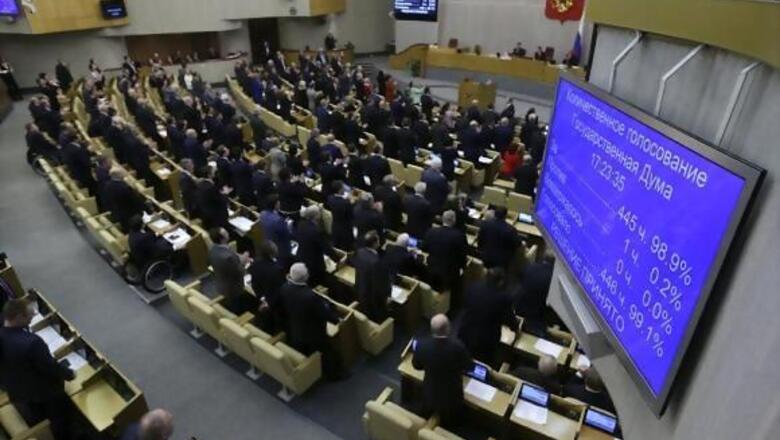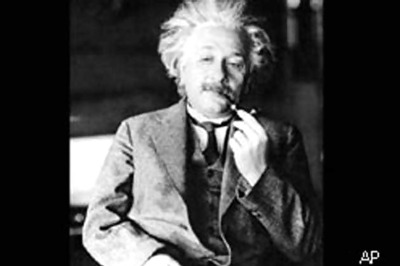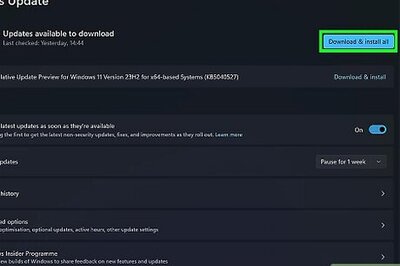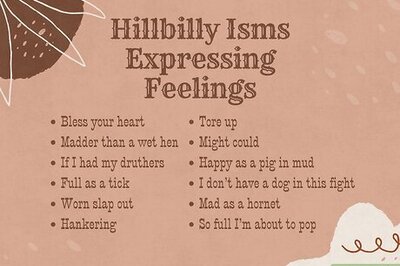
views
US President Barack Obama announced sanctions on Thursday against prominent Russians including close allies of President Vladimir Putin, as Moscow raced to complete its annexation of Crimea and built up its forces in the region.
Moscow responded by announcing its own sanctions against senior US politicians in retaliation against visa bans and asset freezes imposed by Washington on its citizens, with the foreign ministry saying US action would "hit the United States like a boomerang".
With Obama also clearing the way for possible sanctions on vital sectors of the Russian economy, Putin told Russian company bosses to bring their assets home to help the nation survive the sanctions and an economic downturn.
Obama said the action would also target a Russian bank, named by a senior administration official as Bank Rossiya, which is partly owned by Yuri Kovalchuk, a St Petersburg banker whose association with Putin dates back to the early 1990s.
Speaking at the White House, Obama said Russia's threats to southern and eastern areas of Ukraine - which like Crimea have large Russian-speaking populations - posed a serious risk of escalation of the crisis in the region.
"We're imposing sanctions on more senior officials of the Russian government," he said. "In addition, we are today sanctioning a number of other individuals with substantial resources and influence who provide material support to the Russian leadership, as well as a bank that provides material support to these individuals."
Washington announced a first round of sanctions against 11 Russians and Ukrainians it said were involved with the Crimean annexation on Monday. The latest measures cover 20 people including Putin confidantes, the official said, adding that Bank Rossiya - which has $10 billion in assets - would be "frozen out of the dollar".
Those on the Russian list included former presidential candidate Senator John McCain, Senate majority leader Harry Reid and House of Representatives speaker John Boehner.
Obama said he had signed a new executive order expanding the US government's authority to take measures against economic sectors. "Russia must know that further escalation will only isolate it further from the international community," he said.
European Union leaders also gathered in Brussels to consider imposing their own further sanctions on Moscow.
In Moscow, Russia's State Duma lower house of parliament approved a treaty taking Crimea, captured from Ukraine, into the Russian Federation, even as UN Secretary-General Ban Ki-moon was in the Russian capital for talks on the crisis.
Some of Russia's largest companies are registered abroad where they may benefit from lower tax rates but also may enjoy some distance from the Kremlin and feel beyond its reach.
Without referring to Russia's annexation of Ukraine's Crimea region or to slowing economic growth, Putin said it would also be in the bosses' interests to support the Russian economy.
"Russian companies should be registered on the territory of our nation, in our country and have a transparent ownership structure," Putin told heads of Russia's largest companies. "I am certain that this is also in your interests."
In Kiev, the government said its border guards in Crimea, surrounded and outnumbered by Russian forces, had begun redeploying to the mainland after units loyal to Moscow stormed two Ukrainian military bases in the Crimean peninsula's main town of Simferopol on Wednesday.
German Chancellor Angela Merkel told parliament in Berlin that the 28 European Union leaders would show they are ready to ramp up punitive measures in a staged response against Russian officials and move to politically sensitive economic sanctions if goes further.
"The EU summit today and tomorrow will make clear that we are ready at any time to introduce phase-3 measures if there is a worsening of the situation," she said.
Some diplomats read her statement as an implicit recognition that Crimea was lost, and that only further steps by Russia to destabilise Ukraine or intervene in other post-Soviet republics would trigger sanctions that could hurt convalescing Western economies as well as Moscow's.
Russian forces took control of the region in late February following the toppling of Moscow-backed Ukrainian President Viktor Yanukovich by protests provoked by his decision to spurn a trade deal with the EU and seek closer ties with Moscow. People in Crimea voted overwhelmingly in a referendum last Sunday to join Russia.
Only one deputy in the State Duma voted against the treaty, while 443 lawmakers backed it, rising for the national anthem after the vote. The upper house is due to complete the formal ratification on Friday.
"From now on, and forever, the Republic of Crimea and Sevastopol will be in the Russian Federation," pro-Kremlin lawmaker Leonid Slutsky said in an address before the vote.

















Comments
0 comment